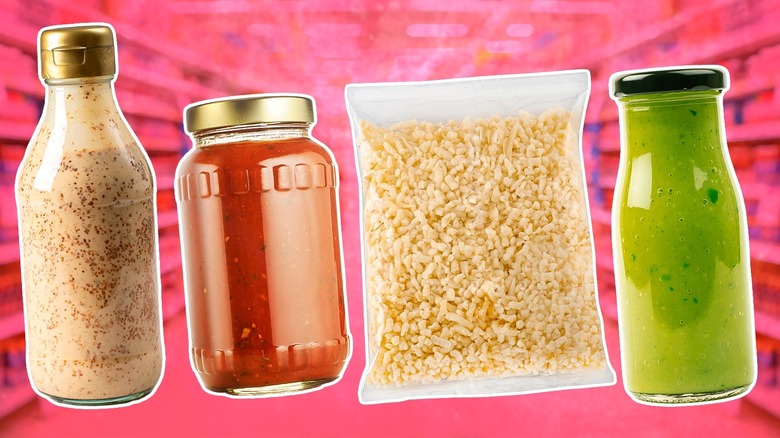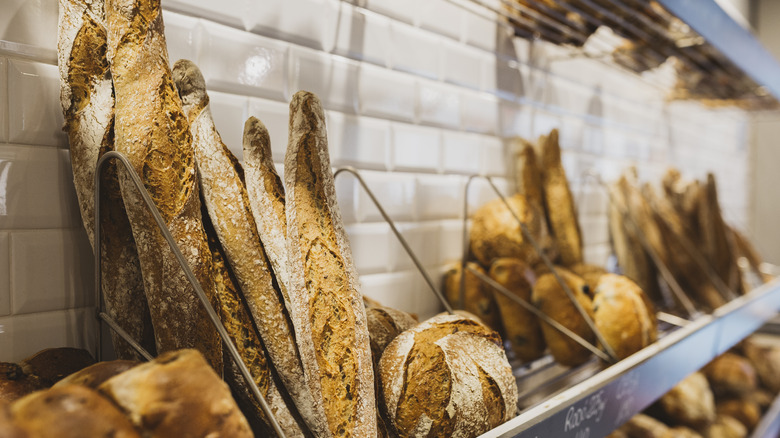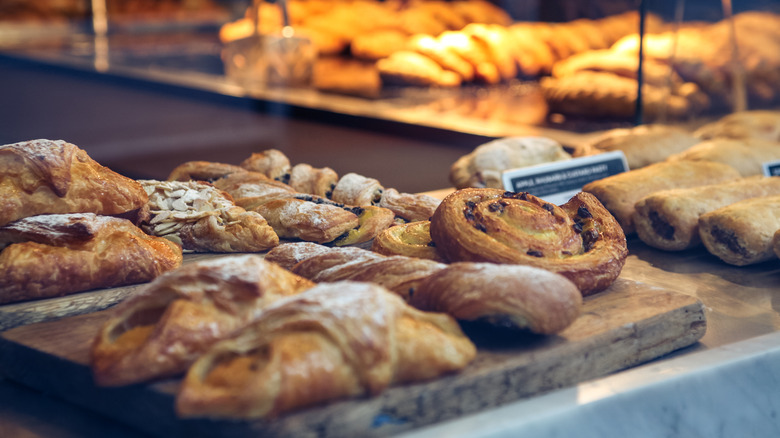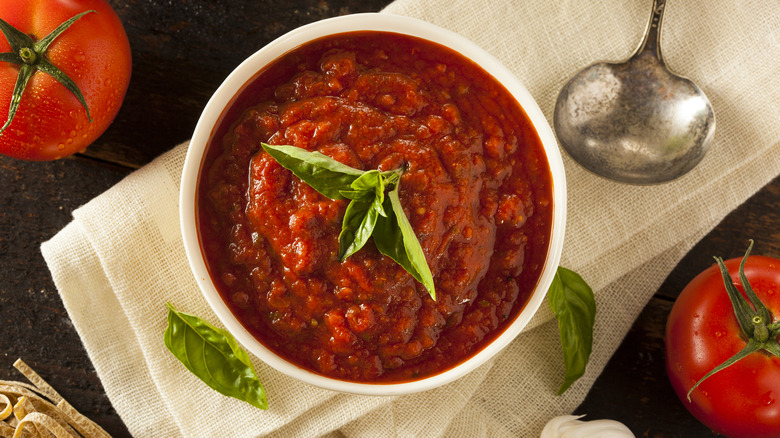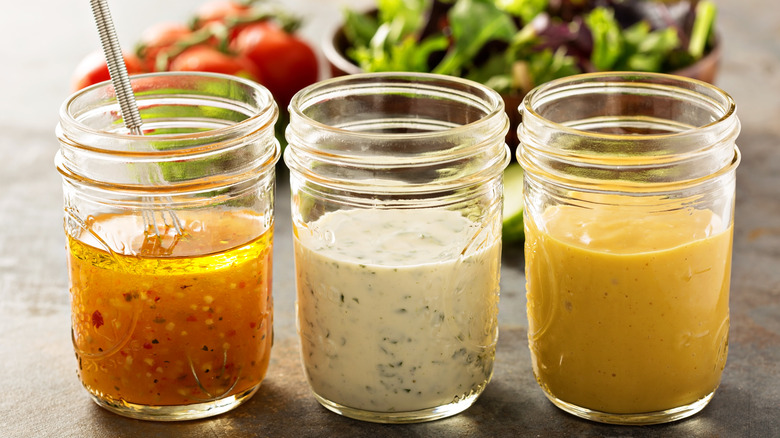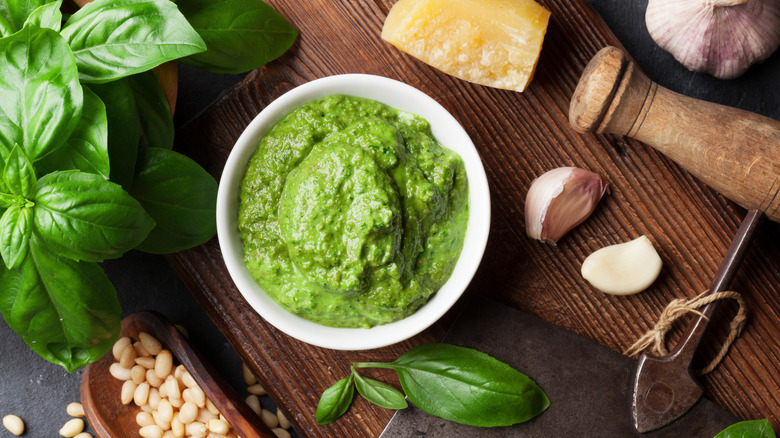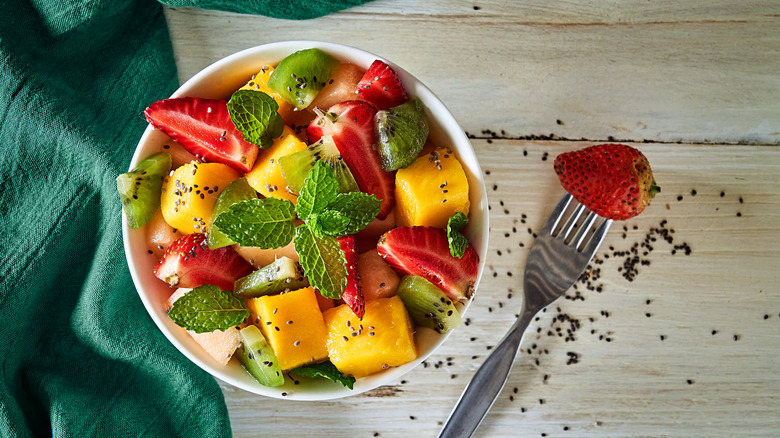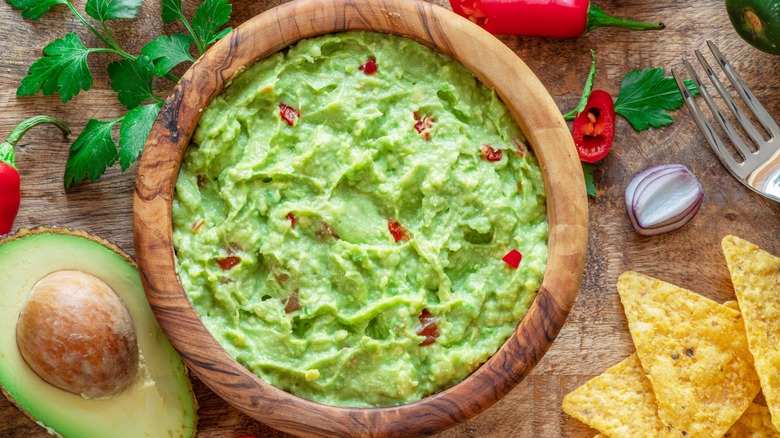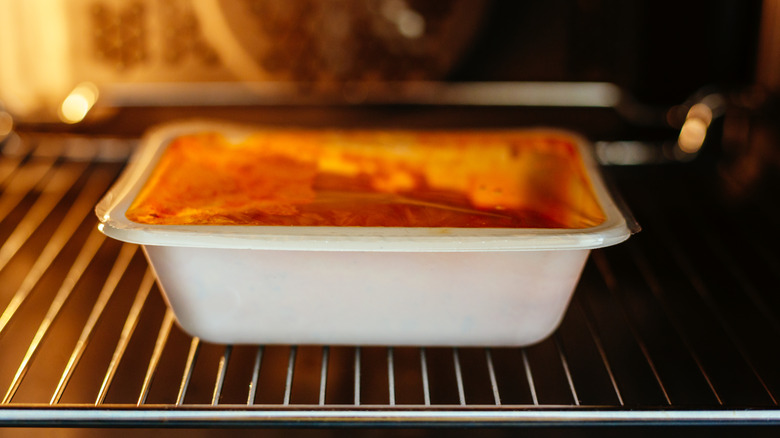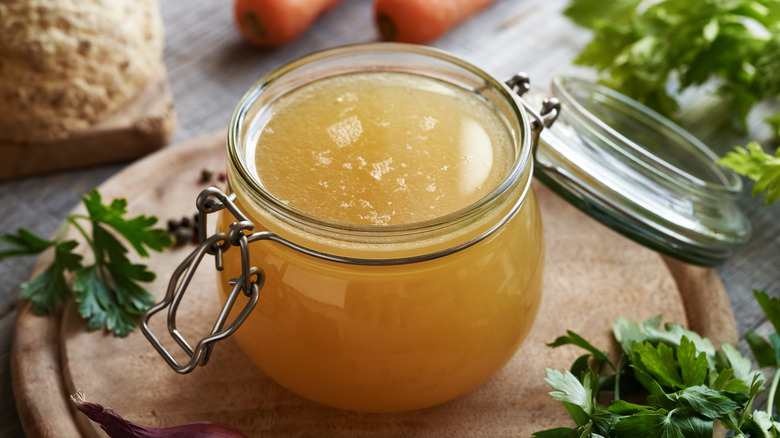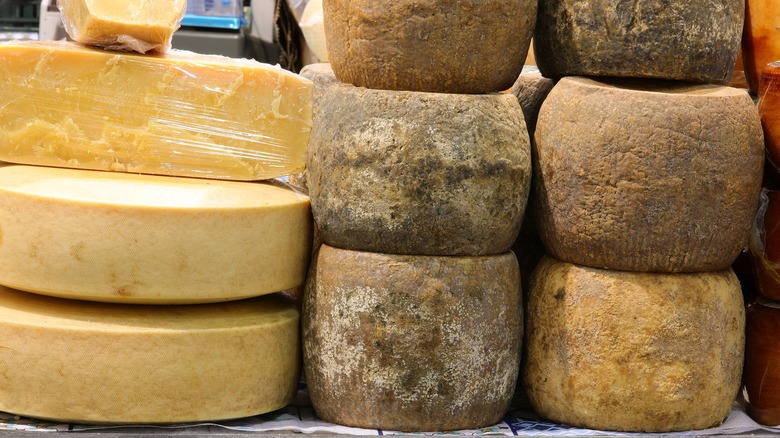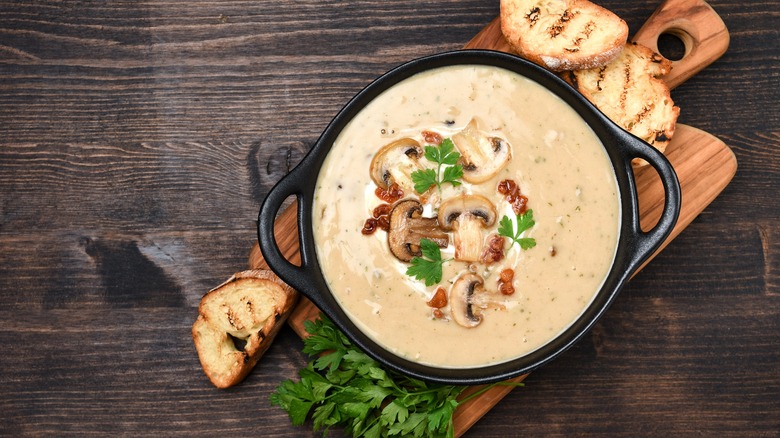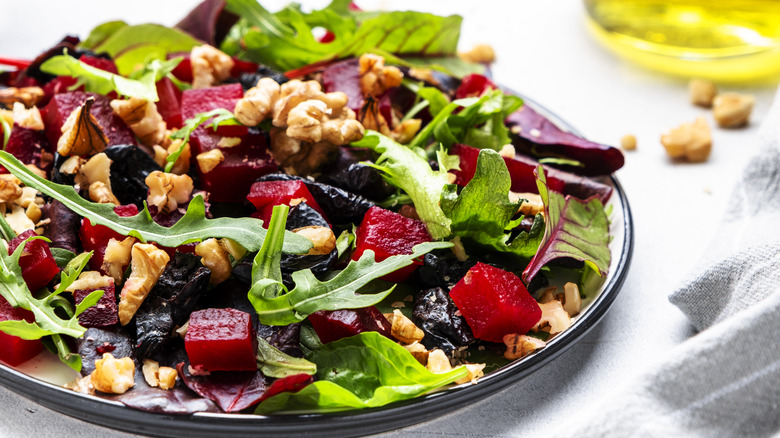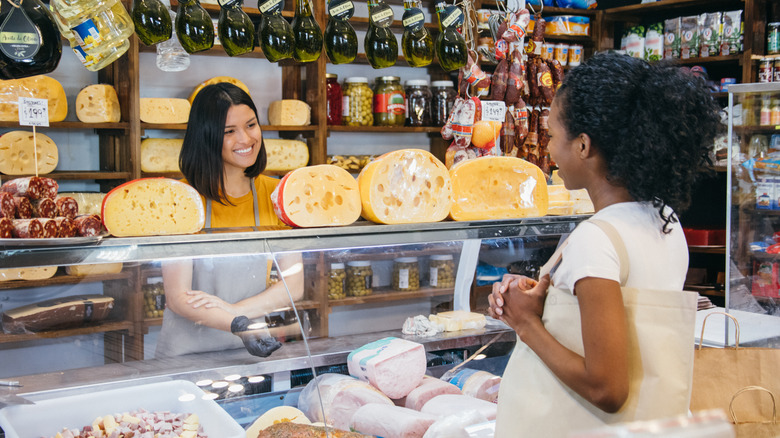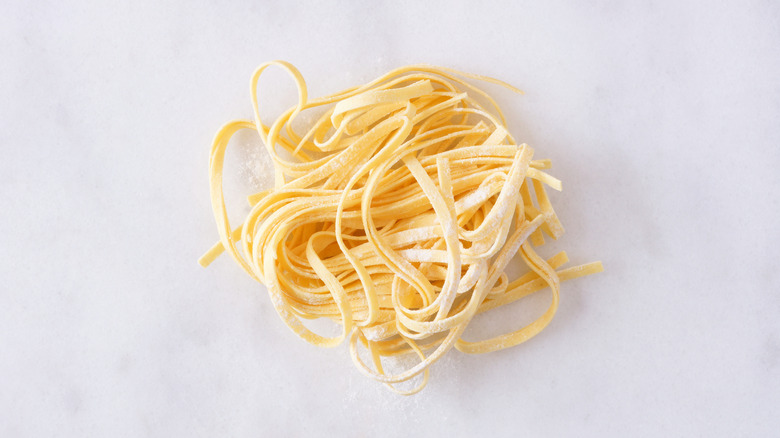15 Grocery Store Items Chefs Always Avoid
Most people do the bulk of their shopping at the grocery store, but is this really the best place to pick up food? While most things are perfectly good from a supermarket, some products are best left on the shelves. There are some grocery store items chefs always avoid — and maybe it's about time to start shopping like a culinary professional.
To find out which grocery store products those in-the-know turn their noses up at, we spoke to three chefs. They explained which foods and ingredients they never buy, whether because small producers make them better, they're superior homemade, or they're not worth buying at all. It turns out that chefs do a lot of their shopping at places other than grocery stores, from getting bread at bakeries to buying coffee from small roasteries. Whether you want to start shopping like a chef or you're just curious, here's what people who cook for a living avoid at the supermarket.
1. Bread
Great bread is transformative. Ripping into a pillowy focaccia or dipping pieces of sourdough into balsamic vinegar and olive oil. But the fact is, most grocery store bread just isn't good. It's usually made weeks before you buy it, so it's packed full of preservatives. It lacks taste and texture. Frankly, it's just sad.
"I'd always rather make the trip to a real bakery for nice breads," says Chef Joe Cash, owner and founding chef of Scoundrel. "Although some of the grocery store versions have gotten better it just doesn't compare to the quality and detail you find from a focused artisanal baker."
Claudia Sidoti — chef and co-owner of Mill and Main in Kerhonkson, NY — agrees with Cash. "I think fresh bread is typically better at a specialty bakery — it's fresh and almost always worth the extra effort." We're not saying that you should never buy grocery store bread. For most people, always buying fresh bread from a local artisanal bakery isn't always practical. However, you should still hit one up once in a while. You won't believe the difference. Before you know it, you'll have a favorite type of sourdough bread and nothing else will do.
2. Pastries and sweet baked goods
Like bread, other baked goods usually aren't great from a supermarket. Pastries are lackluster with unimaginative fillings and basically no lamination. Other sweet bakes, like cookies and cakes, can be tasteless or overly sweet. All in all, you're better off going to a bakery for these things or making your own.
"When it comes to pastries and desserts, I always prefer local bakeries," says Chef Serge Krikorian, owner of catering company Vibrant Occasions and YouTuber at Cooking with the Kriks. "They make fresher, better-tasting pastries and desserts compared to mass-produced grocery store versions. The freshness and texture are just unbeatable."
Chef Claudia Sidoti dislikes "commercial baked goods like cookies and cake." In her opinion, they're too sweet and flavorless. "I prefer to either bake at home or find a quality bakery to get your sweet tooth satisfied," she adds. Bakeries can be pricey, but it's worth treating yourself now and then. You could also put the effort into learning to bake from scratch.
3. Marinara or tomato sauce
A jar of marinara sauce might be tempting when you want to get dinner on the table fast, but it's something that a chef would never buy. These jarred sauces are usually overbearing, with none of the nuance of fresh tomatoes. They don't taste anything like something my nonna would whip up in the kitchen.
"I avoid buying marinara sauce at the grocery store because making it from scratch is so easy and tastes so much better," says Chef Serge Krikorian. "Just warm up some olive oil, add fresh garlic, deglaze with a bit of cabernet, and mix in some crushed San Marzano tomatoes with seasonings. Simmer for 15-20 minutes, and you've got a fresh, flavorful sauce that beats any jarred version."
Krikorian isn't alone. Chef Claudia Sidoti also avoids buying jarred tomato sauce. "It's just not something that seems to measure up to homemade," she remarks. "Plus, homemade is so easy to make — you only need a few ingredients and it comes together in about 20 minutes." Don't be the sucker who buys jarred tomato sauces. It's cheaper and tastier to make your own marinara sauce, and it takes way less effort than you might imagine.
4. Salad dressing
You're probably so used to buying bottled dressings from the store that you might not even think about the possibility of making them yourself. But the chefs we spoke to were against ready-made versions, favoring whipping it up from scratch. Not only does the commercial version lack flavor, but it's so simple to throw together from ingredients you probably already have that it's a waste of money buying it ready-made.
"A good salad dressing goes a long way so I'd always rather make it myself," says Chef Joe Cash. "I can't stand premade salad dressings pretty much across the board. They always leave a weird aftertaste, I assume from preservatives."
Claudia Sidoti of Mill and Main also warns against bottled dressings. Part of the reason is how simple they are to make. "Whether you want a vinaigrette or creamy dressing, throwing together a tasty salad dressing is a snap and leaves so much room for creativity," she notes. "Lemon and olive oil is so simple but from there the sky's the limit." There are so many salad dressing recipes out there, or you can experiment with making your own. Try mixing something sweet and something sour with an oil and work from there.
5. Pesto
If you think you don't like pesto, you might have only ever had the jarred stuff. But you might change your mind if you whip some up at home. When we interviewed Claudia Sidoti, she said that pesto was one of the products she never buys at the grocery store, and there's a good reason for that.
"Pesto is 100% better homemade and you can make it in a flash," Sidoti explains. "You just need basil, garlic, olive oil, your favorite nut, and Parmesan cheese." She says you can spruce it up with extra ingredients, such as lemon or anchovy to take it up a gear. And it's versatile. "You can also always swap out basil for spinach, arugula or an even heartier veg like blanched broccoli," she adds.
Since you can use other nuts instead of pine nuts and greens other than basil, you can tailor it to your preferences or what you already have in your pantry. However, if you want to start with the classic version, this basil pesto recipe is a good one.
6. Pre-cut fruit and vegetables
Those pre-cut fruits and veggies at the store can be tempting. After all, who wants to spend the time prepping veg for dinner or cutting fruit for snacks when you can have a machine do it for you. But there's a reason why chefs never buy them. "Once fruits and veggies are cut, they start losing nutrients and spoil faster, plus they cost more," Serge Krikorian explains. "Whole produce lasts longer and is more nutritious."
So, where possible, you should always steer clear of pre-cut produce. That said, we understand how busy and stressful life can be. Sometimes the act of having to cut up your own veggies for dinner is enough to make you pack it in and order pizza instead. Eating pre-cut fruit and vegetables is better than not eating fresh produce at all. If all you can muster is throwing some already-cut veggies into a pot, have at it.
7. Guacamole
If you're still buying guacamole from the store, you're missing out on the joys of it fresh. This dip is so easy to whip up and so much tastier when made from scratch that you'll never find a chef buying it from the store. Chef Claudia Sidoti always prefers to make her own guac. "The premade supermarket brands usually just don't have the freshness I'm looking for," she says.
Luckily, it's a breeze to make. A basic guac recipe consists of ripe avocados, lime juice, salt, onion, tomato, and cilantro. Many people swear by adding a secret ingredient to guacamole. For some, that's the umami kick of Worcestershire sauce. For others, using orange juice instead of lime juice brings a welcome sweetness. Sour cream is another frequent addition, as are hot peppers to bring some spice. There are a bunch of ways you can modify this dip, but starting with a solid basic recipe is ideal. Then you can riff off it from there.
8. Frozen dinners
Is your freezer full of frozen dinners? If so, you certainly aren't shopping like a chef. Food professionals tend to avoid these kinds of microwaveable frozen meals in favor of buying fresh ingredients. It's not like most chefs want to put together an elaborate meal when they come home after a long day of cooking, but there are plenty of quick, easy dinners you can make with fresh ingredients. You should leave premade meals in the freezer, where they belong.
Chef Serge Krikorian avoids frozen meals because they're "often packed with sodium, preservatives, and artificial flavors." He adds that "making meals at home gives you control over the ingredients and quality." You're always more likely to make something good yourself, even if you aren't hugely experienced in the kitchen.
But what if you sometimes need the convenience of frozen meals? Well, you can make your own. "I like to cook larger batches and freeze portions for later," Krikorian remarks. "It's healthier and more economical." Many meals freeze well and stay fresh for around 6 to 12 months when stored correctly, so there's no need to pick up frozen dinners from the store.
9. Stock and broth
Most people buy stocks and broths in boxes, or as powders or cubes to dissolve in water. But, for some chefs, this just won't do. These kinds of ready-made stocks don't always live up to expectations. Rather than bringing piles of flavor to a dish, it ends up just watering it down.
"I pass on the boxed stocks and broth," Chef Joe Cash remarks. "They do in a pinch but there is so much more character and depth in a homemade stock. Besides, it's simple enough to make and freezes well for future use."
It might seem like a huge ordeal to make stock from scratch. But, really, it just involves boiling down your choice of broth ingredients and draining the stock from the solids when you're done. It's mostly inactive time so you don't have to stoop over a hot stove for hours — just leave it to simmer while you do your thing. The resulting stock will have a richness you can't get in a box. You can freeze extra portions and use it without even defrosting it first.
10. Coffee
Anyone who's serious about coffee needs to stop buying it at the grocery store. For real. You usually can't find quality beans in supermarkets. Certainly, none that rival what a barista can brew up for you. So, if you've been wondering why the coffee you make at home isn't as good as you'd like it to be, your choice of beans might be the culprit. Using beans that aren't worth their salt is among the common mistakes people make when brewing coffee at home.
Serge Krikorian buys his coffee from local roasters. "Specialty-grade coffee from a local roaster is usually fresher and has a superior flavor profile compared to grocery store coffee," he says. "Local roasters focus on quality, and you can really taste the difference." Artisan coffee roasteries usually choose their beans carefully, looking not only at roast level but also growing regions, growing altitude, and processing method. These beans often list tasting notes so you can find ones that suit your palette.
Expert Claudia Sidoti also likes to avoid grocery stores when buying beans. "I prefer to shop for coffee at a place that brews a good cup. Look for private labels at your favorite coffee bar or a store that has a healthy variety of beans and grinds fresh," she suggests.
11. Shredded cheese and specialty cheeses
Do you reach for the convenience of shredded cheese when you're at the grocery store? You might want to think again, if so. "Pre-shredded cheese has additives to prevent clumping, which affects its flavor and melting quality," Chef Serge Krikorian explains. "I always buy blocks of cheese and shred it myself. It's fresher and melts better." It might take a few extra minutes to shred cheese yourself, but it's worth it.
What's more, if you're looking for specialty cheeses, a supermarket isn't the best place to find them. "If you want to explore the world of cheese, it's best to go to a specialty shop," says Mill and Main chef Claudia Sidoti. "They almost always have knowledgeable staff to help answer questions and typically are happy to offer samples which ensures you get what you like." Specialty cheese shops also have a far larger selection. They're likely to stock cheeses from small producers that you'd never find in a grocery store.
12. Soups
You can find a huge variety of canned and fresh soups and the grocery store, but should you be buying them? Chefs certainly aren't flocking to stock up on ready-made soup. It's so simple to make yourself and you can store extra portions in the fridge or freezer for when you need a quick meal.
Chef Serge Krikorian always avoids store-bought soup. "Homemade soup is so easy to make and much better than pre-made versions," he says "You can control the ingredients and avoid the high sodium and preservatives found in store-bought soups." But it's not just about nutrition. Flavor also plays a big part. "Homemade soup tastes fresher and more flavorful," Krikorian adds.
You just can't beat a big pot of homemade soup, whether it's minestrone, blue cheese and broccoli, pumpkin, or anything else that takes your fancy. It comes together quickly and easily, and you can draw inspiration from the ingredients you already have in your fridge or pantry. Do yourself a favor and avoid grocery store soup in favor of the homemade kind.
13. Pre-made salad
We've already talked about salad dressings, but it's also a good idea to avoid prepared salads at the grocery store. You can usually find chopped salads in with the produce, items like pasta salad and couscous salad in the chiller section with prepared foods, and a range of varieties in the deli section or salad bar section of large grocery stores. All of these are worth avoiding for various reasons.
"Pre-made salads often sit out for long periods and lose freshness," Serge Krikorian explains. Generally, salads are fresh and vibrant, but store-bought ones lose that edge. While those found in supermarket delis and salad bars can be quite good, ones from the chiller often lack flavor.
Krikorian says you get "better quality and taste" by making them at home. It's so easy to throw together a salad that it makes sense to do it yourself. It also works out way cheaper than pre-packaged options. Of course, there are going to be some days when food prep is off the table and all you can manage is pre-made salad, but it's not something you'll find in a chef's fridge.
14. Deli items
Sandwiches, sliced cheeses, cold cuts, and a range of prepared foods are among the common items found at deli counters. It's a great way to pick up food for quick dinners, workday lunches, picnics, and more. But chefs tend to avoid grocery store delis.
Claudia Sidoti tells us she avoids prepared food from the deli counter at a supermarket. "I just don't trust how long it's been sitting around," she says. However, it's not that she totally eschews deli foods, she's just picky about where she buys them. "I'd rather go to a quality deli," she adds.
Serge Krikorian is another deli-avoider. He says that deli items are "usually more expensive and less nutritious than homemade versions." So, he prefers to whip up the kinds of foods he might find at a deli at home. This isn't always practical, of course, so having a good neighborhood deli on your radar for those times when convenience is vital.
15. Fresh pasta
Fresh pasta is usually found in the chiller section of grocery stores. Unlike dried pasta, it contains eggs and needs to be refrigerated. Because it's not preserved by the drying process, it has a much shorter shelf life than the dried pasta. Chef Claudia Sidoti isn't a big fan of refrigerated fresh pasta products at most supermarkets. Good fresh pasta is more tender and rich than dried pasta and elevates a range of dishes.
You can make pasta from scratch at home. It's easier than you might think, especially if you have a pasta maker. However, realistically, we know it's more of a special occasion meal. You're probably not going to craft fresh pasta by hand on an average Tuesday. "If you don't want to make it from scratch, look for an Italian market that specializes in fresh pasta or a specialty food shop that has a fresh pasta offering," Sidoti says. And, of course, there's always dried pasta. People often think that fresh pasta is always the best choice, but in Italy, it's traditional to use dried pasta for some recipes, and many people cook with it at home. So, don't be afraid to choose a solid dried pasta over a mediocre fresh one.
